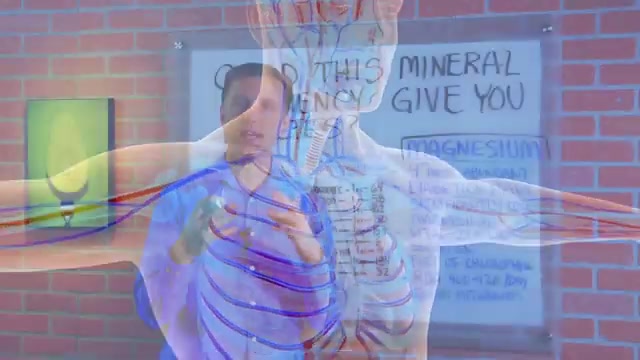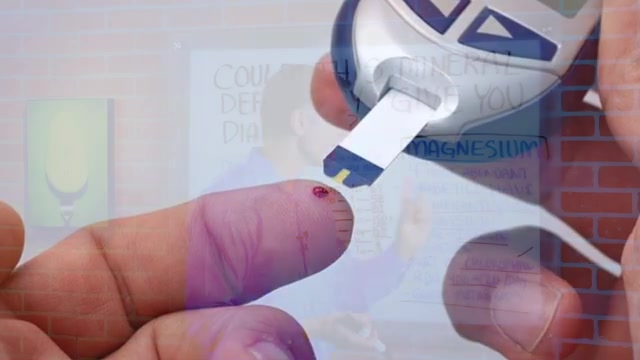
https://www.youtube.com/watch?v=6Nm_3qUGGYA
Could This Magnesium Mineral Deficiency Give You Diabetes – Dr.Berg on Magnesium and Diabetes

Could this mineral deficiency actually give you diabetes ?
And I'm talking about magnesium .
Magnesium is the 4th most abundant mineral in the entire body .
It works as a helper nutrient in certain enzyme reactions .
It's involved in over 300 chemical reactions including its effect on insulin .
So it helps to regulate insulin .
It's involved in glucose metabolism .
I want to put an interesting study down below related to diabetics .
And it was found that diabetics have significantly lower magnesium levels than healthy people .
And I'm also talking about prediabetics and people with insulin resistance .
When you're deficient in magnesium , you worsen insulin resistance .
When you take magnesium , you improve insulin resistance .
That allows better blood sugar control and all the other effects that insulin is supposed to have .

Now the RDAs are recommended amounts of magnesium that we need per day for a male body is between 400 to 420 milligrams .
For a female , it's in the 300 .
Okay .
So let's talk about what food is high in magnesium .
Well , chocolate .
One ounce has 64 milligrams .
One avocado will give you 58 milligrams .
Nuts , 1 ounce , 82 milligrams .
Seeds , just one ounce will give you a 150 milligrams of magnesium .
And by the way , pumpkin seeds have the most magnesium .
Leafy greens , 1 cup , a 157 milligrams .
So if you had , I don't know , like maybe 2 and a half to 3 cups of salad per day , you're gonna get your magnesium .
Very few people even have that much .
One egg has 6 milligrams of magnesium .
One ounce of meat or fish has only 9 milligrams of magnesium .
Steak , 6 ounces has only 32 .

So all the meats in general are not high in magnesium .
Hummus , 1 cup is a 184 milligrams of magnesium .
And magnesium also works with calcium together in the contraction and relaxation of muscles .
And I'm also including smooth muscle like in your arteries .
So if you're deficient in magnesium , guess what's gonna happen ?
Blood pressure is gonna go up .
And this is why people take magnesium for their blood pressure , for their heart , for cramps in their calves .
Now the question is how do you become deficient ?
Okay .
Number 1 , you're probably not consuming enough food with magnesium .
Magnesium is part of the chlorophyll complex .
So a very few people are consuming enough greens , number 1 .
They're doing too many refined carbs .
A refined carbohydrate and I'm talking about the breads , pasta , cereal , crackers and also the refined sugars will deplete magnesium .
Caffeine will deplete magnesium .
Alcohol will deplete it .
Diuretics .


There's a diuretic called thiazide .
Okay .
Thiazide creates a magnesium deficiency and when someone's on this diuretic , their risk of diabetes increases probably because of the deficiency of magnesium .
And what's interesting is that a lot of diabetics have high blood pressure .
They're taking this diuretic thiazide , okay , which is actually worsening the diabetes .
K ?
And they don't know about this magnesium point here .
Also , when you have insulin resistance , which I believe the majority of population has , you're gonna have a hard time absorbing magnesium .
So what you need to know is that when you take magnesium in a supplement or through your food , you actually can improve insulin resistance right here and therefore increasing your absorption of magnesium .
Okay .
So they both work really closely together .
Alright , guys .
So thanks for watching .
Now you know the connection between magnesium , your blood sugars , magnesium and blood pressure , and also cramping .
Thanks for watching .

So if you're enjoying this content , go ahead and share it with someone that could really benefit from it .
Are you looking for a way to reach a wider audience and get more views on your videos?
Our innovative video to text transcribing service can help you do just that.
We provide accurate transcriptions of your videos along with visual content that will help you attract new viewers and keep them engaged. Plus, our data analytics and ad campaign tools can help you monetize your content and maximize your revenue.
Let's partner up and take your video content to the next level!
Contact us today to learn more.